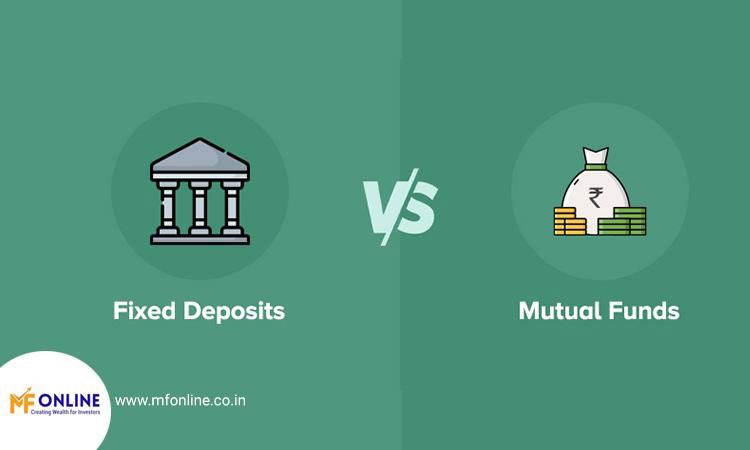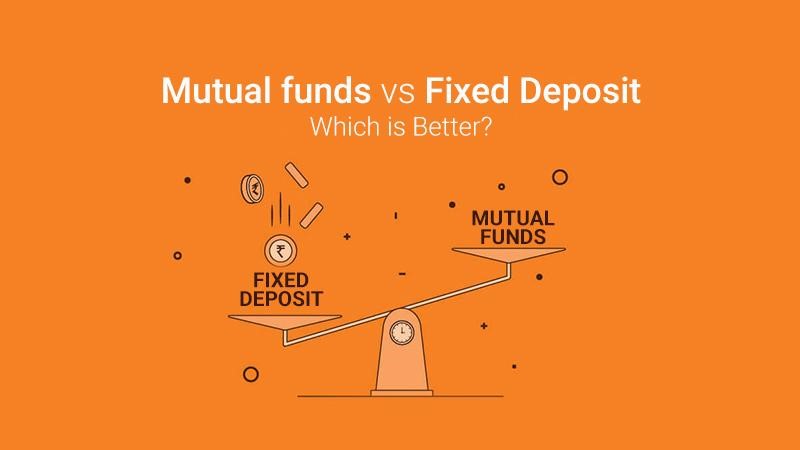Mutual Funds vs Fixed Deposits Comparison
02 February 2022
Mutual fund v/s fixed deposit; both are popular investment choices. However, each financial vehicle is distinct and offers investors attractive rewards over time.
It's common to feel anxious when you first begin your savings journey. As a new investor, you may have many questions about getting started, what to invest in, where to put your money, returns on investment, and tax responsibilities. Of course, each financial instrument caters to different end goals. But, the most popular choice among investors is a fixed deposit and mutual funds. So, the next obvious question is whether a mutual fund or fixed deposit is better among the two?
If you wish to invest in one of these financial vehicles, you need to analyze the two thoroughly. The following is a comparison between Mutual Funds and Fixed Deposits. But before we draw any comparisons between the two, let us look at each financial instrument separately.
What Is Fixed Deposit?
As the name implies, FDs give investors a fixed interest rate for a certain period. The duration of an FD might range from seven days to ten years. Interest on bank FDs is compounded, which means you earn interest on the interest that has already been accrued.
Some leading banks have now revised the interest rate in 2021 and offer the highest interest rates of 5.50%-5.75%p.a for a tenure of 5 years.
What Are Mutual Funds?
A mutual fund is a financial vehicle that invests in securities such as stocks, bonds, money market instruments, and other assets by pooling money from many investors. Professional money managers manage mutual funds, allocating assets and generating capital gains or income for the fund's investors. The mutual fund portfolio is built and managed to meet the investment objectives indicated in the prospectus.
Key Differences Between Mutual Funds V/S Fixed Deposit?
Now that we have explained the meaning of fixed deposit v/s mutual fund individually, let us go through the fundamental differences between the two.
| CRITERIA | MUTUAL FUND | FIXED DEPOSIT |
|---|---|---|
| Safety | Mutual funds are subject to market risk. Depending on the investor’s end goal and risk appetite, various schemes are available with different risk profiles. | On the other hand, a fixed deposit is a safe vehicle for risk-averse investors. |
| Returns | Mutual fund returns are directly tied to the market they invest in and are entirely reliant on stock market performance. | Fixed deposits provide guaranteed returns at a predetermined rate of return for a given duration of time. |
| Expenses | Mutual funds have specific fees and expenditures deducted as part of the fund's management. I.e., Fees paid to fund managers who manage an investor's portfolio are one of the charges or expenditures of investing in mutual funds. | Individuals who invest in fixed deposits, on the other hand, do not bear such costs because there are no intermediaries involved in the investment process. |
| Risk | The risk of a mutual fund varies from fund to fund, and the market primarily determines it. As a result, investors may profit more if market circumstances are favorable or lose a lot of money if they swing in the opposite direction. | Fixed deposits are generally risk-free investments since investors know exactly how much money they will receive overtime. Fixed deposit rates do not fluctuate, and they are not affected by market fluctuations or volatility so that investors can expect a consistent return on their money. |
| Withdrawal | Premature withdrawals from mutual funds are permissible as long as the minimum holding time has been met; however, they will charge an exit load of 1% of the fund's value if a withdrawal is made before the holding period has expired. | Depositors who want to withdraw their money will have to break their FD and pay the penalty for doing so early. |
| Taxation | Short-term and long-term capital gains taxes apply to all mutual funds. STCG is calculated at a fixed rate of 15%, whereas LTCG is calculated at 10% of earnings beyond $1 lakh. In the case of debt funds, the LTCG is 20% after indexation. | Any interest a person receives on a fixed deposit is taxed, depending on which tax bracket you fall into. |
Mutual Fund Or Fixed Deposit Which Is Better?

While comparing mutual fund v/s fixed deposit, it is clear that both the financial instruments have a set of advantages and disadvantages. As a result, it is recommended that anybody interested in investing in either of them takes some time to obtain information to assist them in making an informed decision.
There are certain benefits of investing in Mutual funds.
Advantages of Investing in Mutual Funds?
- Provides higher returns
- Fund managers with years of expertise will adequately handle your money.
- SIP (Systematic Investing Plans), SWP (Systematic Withdrawal Plans), STP (Systematic Transfer Plan), and other new techniques of investment and withdrawal are available.
- Aids in diversification.
- Allows minimum investment through SIPs, thereby reducing risk.
- One of the significant advantages of investing in a mutual fund is that while comparing mutual funds v/s fixed deposit, FD interest rates are now barely able to keep up with inflation. Due to RBI's dramatic interest rate cuts in the aftermath of the COVID-19 outbreak.
Conclusion: Mutual Fund v/s Fixed Deposit
What is appropriate for one person's financial goals may not suit another's. As a result, whether you choose a fixed deposit or mutual funds will be determined by your risk appetite and the type of returns you seek. When comparing fixed deposits with mutual funds, it's important to note that there's no one-size-fits-all answer.
Frequently Asked Questions?
Which is better FD or mutual funds?
It entirely depends on the investment horizon and risks tolerance of the investors. We would suggest investing in mutual funds for a long time, providing the investor with the power of compounding. Moreover, it helps to diversify, reducing the risk associated with the funds.
Which is better FD or equity?
When it comes to stock, you may take advantage of the company's dividend income at the end of the year. This reward is only possible if you keep the stocks for an entire year. On the other hand, fixed deposits provide dividends at regular intervals if you pick non-cumulative FDs.
Is Mutual Fund Safe?
Yes, be rest assured that mutual funds are completely safe. It is regulated and supervised by the SEBI.
Disclaimer: All Mutual Funds are subject to market risk. Please read all scheme-related documents carefully.



